#Corps Commander Peshawar
Explore tagged Tumblr posts
Text
Chitral triumphs over Gilgit in Shandur Polo Festival 2025 final | The Express Tribune
Listen to article The Shandur Polo Festival 2025 concluded in spectacular fashion on Sunday, as Chitral defeated Gilgit 9–7 in the final match played at the world’s highest polo ground before a crowd of thousand. The final took place before thousands of spectators at Shandur Pass often referred to as the “roof of the world,” at an altitude of 12,000 feet, attracting local crowds and foreign…
#Chitral polo win#Chitral vs Gilgit#Corps Commander Peshawar#free fall display Shandur#Frontier Corps KP North#Gilgit Baltistan polo#Gilgit polo team#Kalasha dance Shandur#Khyber Pakhtunkhwa polo#Lieutenant General Umar Ahmad Bukhari#Pakistan Army SSG Shahbaz#Pakistan polo festival#paragliding demonstration Kakul#Shandur crowd 2025#Shandur festival closing ceremony#Shandur final match#Shandur Pass polo#Shandur Polo Festival 2025#traditional polo Pakistan#world’s highest polo ground
2 notes
·
View notes
Text
The War Against Kharijites and Facilitators Working at the Behest of Enemy Elements Will Continue Until Its Logical Conclusion: Army Chief

Bannu: Terrorist groups, including the Kharijites, are carrying out operations against Pakistan from Afghan territory.
Army Chief General Asim Munir stated that terrorist groups, including the Kharijites, are carrying out operations against Pakistan from Afghan soil. The use of foreign weapons in terrorist attacks is proof that Afghanistan has become a safe haven for such elements.
According to a statement from the Inter-Services Public Relations (ISPR), General Asim Munir visited Bannu, where he was received by the Corps Commander Peshawar. The Army Chief was briefed on the ongoing operations and the overall security situation in the area.
The ISPR statement further mentioned that the Army Chief visited the CMH Bannu to inquire about the well-being of the injured soldiers. He praised the soldiers' high morale and steadfastness and expressed heartfelt condolences to the families of the civilians who lost their lives in the Bannu cantonment terrorist attack.
According to the Pakistani Army spokesperson, General Asim Munir addressed the soldiers in Bannu and praised their courageous efforts in thwarting the attackers' evil intentions.
The Army Chief stated that the Pakistan Army will continue to play its role in ensuring the security and stability of the state, and the brave soldiers immediately neutralized the perpetrators of the incident.
General Munir added that the planners and facilitators of this heinous attack would soon be brought to justice, exposing the true intentions of the anti-Islamic Kharijites who target civilians.
He further emphasized that national unity is crucial in the fight against terrorism, and the Pakistan Armed Forces will leave no stone unturned in ensuring the protection and safety of the people.
General Asim Munir also highlighted that terrorist groups, including the Kharijites, continue to operate from Afghan territory against Pakistan, and the use of foreign weapons in these attacks is clear evidence that Afghanistan has become a safe haven for such elements.
The Army Chief concluded by stating that no institution will be allowed to disrupt Pakistan's peace and stability.
#Army Chief#Pakistan#Terrorist groups#Kharijites#Afghan territory#Inter-Services Public Relations (ISPR)#Bannu#Pakistani Army
0 notes
Text
Faiz Hameed Posted as Corps Commander XI, Nadeem Ahmed Anjum New DG ISI
Faiz Hameed Posted as Corps Commander XI, Nadeem Ahmed Anjum New DG ISI
Lieutenant General Nadeem Ahmad Anjum Appointed as DG ISI in place of Faiz Hameed. As per unofficial reports, Lieutenant General Faiz Hameed has been posted as the Corps Commander XI also known as Corps Peshawar. He was earlier Director General of the Inter Services Intelligence (DG ISI). The reports further claimed that Lieutenant General Nadeem Ahmad Anjum has been posted as Inter Services…
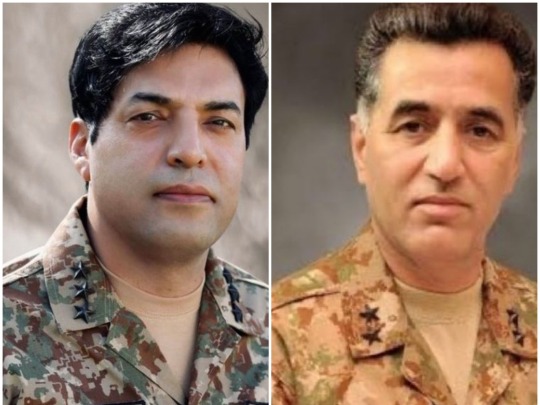
View On WordPress
0 notes
Text
Lt Gen Faiz Hameed assumes command of Peshawar Corps
Lt Gen Faiz Hameed assumes command of Peshawar Corps
Lieutenant General Nauman Mahmood is handing over the command of Peshawar Corps to Lieutenant General Faiz Hameed. Photo: ISPR Lieutenant General Faiz Hameed has assumed his new responsibilities as Peshawar Corps Commander.Lieutenant General Nauman Mahmood hands over the command of Peshawar Corps to Lieutenant General Faiz Hameed.Lt Gen Nadeem Anjum was appointed the new DG ISI by Prime…

View On WordPress
0 notes
Text
Violent clashes have broken out in Pakistan between security forces and supporters of former prime minister Imran Khan after he was arrested on Tuesday.
Protests are erupting nationwide, and at least one person has been killed in the city of Quetta.
The United States and UK have called for adherence to the "rule of law".
Mr Khan was arrested by security forces at the High Court in the capital, Islamabad.
Dramatic footage showed dozens of officers arriving and detaining the 70-year-old, who was bundled into a vehicle and driven away.
He was appearing in court on charges of corruption, which he says are politically motivated.
Mobile data services in the country were suspended on the instructions of the interior ministry on Friday as protests grew, many of them taking place in front of army compounds.
Pakistan's army plays a prominent role in politics, sometimes seizing power in military coups, and, on other occasions, pulling levers behind the scenes.
Many analysts believe Mr Khan's election win in 2018 happened with the help of the military. Now in opposition, he is one of its most vocal critics, and analysts say the army's popularity has fallen.
Footage from Lahore posted on Twitter appeared to show a crowd breaking into the military corps commander's house destroying furniture and belongings inside.
Speaking from Washington, the US Secretary of State Antony Blinken said he wanted to make sure that "whatever happens in Pakistan is consistent with the rule of law, with the constitution".
UK Foreign Secretary James Cleverly, speaking alongside Blinken, noted that Britain enjoyed "a longstanding and close relationship" with Commonwealth member Pakistan, and wanted to "see the rule of law adhered to".
On Tuesday evening, supporters of Imran Khan gathered outside the Pakistan High Commission in London to protest against his arrest.
'Chaos and anarchy'
Mr Khan was ousted as PM in April last year and has been campaigning for early elections since then.
General elections are due to be held later this year.
Speaking to the BBC's Newshour, Mr Khan's spokesman, Raoof Hasan, said he expected "the worst" and that the arrest could plunge the country "into chaos and anarchy".
"We're facing multiple crises. There is an economic crisis, there is a political crisis, there is a cost of livelihood crisis and consequently this occasion will be a catharsis for them to step out and I fear a fair amount of violence is going to be back," he said.
A member of Mr Khan's legal team, Raja Mateen, said undue force had been used against him at the court.
"Mr Khan went into the biometric office for the biometrics. The rangers went there, they broke the windows, they hit Mr Khan on the head with a baton," said Mr Mateen.
Mr Khan's Pakistan Tehreek-e-Insaf (PTI) party called on its supporters to protest. In the hours after he was detained, violence was reported from cities including Lahore, Karachi and Peshawar.
On the streets of Islamabad, hundreds of protesters blocked one of the main highways in and out of the capital.
People pulled down street signs and parts of overpasses, lit fires and threw stones. During the hour or so that the BBC was there, no police or authorities were visible.
Protesters said they were angry about Imran Khan's arrest.
"This is absolutely the last straw," said Farida Roedad.
"Let there be anarchy, let there be chaos. If there is no Imran, there's nothing left in Pakistan. No one is there to take over."
Writing on social media, police in Islamabad said five police officers had been injured and 43 protesters arrested.
It said at least 10 people, including six police officers, had been injured in the south-western city of Quetta in clashes between Mr Khan's supporters and security forces - with one protester killed.
A statement from the inspector general of Punjab police said the arrest of Mr Khan had been ordered because he was accused of "corruption and corrupt practices".
The case involves allegations over the allotment of land in the so-called Al-Qadir Trust, which is owned by Mr Khan and his wife, Dawn newspaper reported.
Mr Khan, who is being held at an undisclosed location, denies breaking any law.
In a video message filmed as he travelled to Islamabad - and released by the PTI before his arrest - Mr Khan said he was ready for what lay ahead.
"Come to me with warrants, my lawyers will be there," he said. "If you want to send me to jail, I am prepared for it."
Security was tight in the centre of the capital for the former PM's court appearance.
Dozens of cases have been brought against Mr Khan since he was ousted from power.
The security forces have tried to detain him on a number of previous occasions at his Lahore residence, but were blocked by his supporters, resulting in fierce clashes.
On Tuesday, police had blocked roads into Islamabad, so the number of supporters with Imran Khan was not as high as on previous occasions, making it easier to arrest him.
He was elected prime minister in 2018, but fell out with Pakistan's powerful army. After a series of defections, he lost his majority in parliament. He was ousted after he lost a confidence vote in April 2022, four years into his tenure.
Since then, he has been a vocal critic of the government and the country's army.
In October, he was disqualified from holding public office, accused of incorrectly declaring details of presents from foreign dignitaries and proceeds from their alleged sale.
The next month, he survived a gun attack on his convoy while holding a protest march.
On Monday, the military warned him against making "baseless allegations" after he again accused a senior officer of plotting to kill him.
2 notes
·
View notes
Text
Pakistan’s ongoing political crisis has reached a crescendo this month with former Prime Minister Imran Khan’s arrest and its fallout. The contours of the conflict are clear: it is Khan versus Pakistan’s military establishment. And the gloves are off.
Khan was arrested on May 9 from the premises of the Islamabad High Court, whisked away by dozens of paramilitary troops in riot gear, ostensibly for a corruption case. But the manner and timing of his arrest — coming just after he had doubled down on his allegations that a senior intelligence official was responsible for an assassination attempt against him last November — indicated that the arrest was more about the confrontation between Khan and Pakistan’s military which began last spring with his ouster in a vote of no-confidence.
The arrest set off protests on the same day across Pakistan, some of which turned violent and involved vandalism against military installations. In unprecedented scenes, protesters attacked the gate of the army headquarters in Rawalpindi, the corps commander’s house in Lahore, and other buildings, including the Radio Pakistan offices in Peshawar. At least eight people died in clashes with the police. The country’s telecommunications authority shut off access to mobile internet services and social media for several days. In response to the protests, police have arrested thousands of Khan’s party workers, reportedly harassing their families in the process; many of them are yet to be produced in court. They also arrested senior leaders of Khan’s party, the Pakistan Tehreek-e-Insaf (PTI), and key members of his former cabinet: his former foreign minister, finance minister, human rights minister, and information minister.
On May 11, Pakistan’s Supreme Court deemed Khan’s arrest from the premises of a court unlawful, and the Islamabad High Court granted him bail the following day. As he was released, he pointed a finger at one man: Pakistan’s army chief, General Asim Munir.
A fight to the finish
Khan’s confrontation with the military has now devolved into an existential, zero-sum fight between the country’s most popular politician and its most powerful institution. Khan, once the military’s favored politician, has since last year stoked popular resentment against the institution, which he blames for his ouster. The attacks on military buildings after Khan’s arrest damaged the institution’s veneer of invincibility. The military — long Pakistan’s sacred cow, its one institution deemed untouchable — has not taken kindly to Khan’s dissent. It has responded forcefully to the protests on May 9 — which it has called a “black day” — saying that violent protesters will be tried in military courts. Trying civilians in army courts would violate Pakistan’s obligations under international human rights law. But Pakistan’s National Security Council backed the military’s decision and its civilian government has lined up behind it, dealing a blow to the constitution and rule of law in the country. This week, an anti-terrorism court in Lahore allowed the handing over of 16 civilians to the military for trials.
In some ways, Khan’s popular support had acted as a buffer over the last year against the military’s assertiveness. But after the protests on May 9, the military establishment has reverted to its usual playbook for political leaders and parties that fall out of line in Pakistan. In this, it is using the pliant coalition government as its partner, as it has in the past with the government of the day. For its part, the government, in its eagerness to comply with the establishment, has been all too willing to forget the lessons of the past, when it itself had been at the receiving end of the establishment’s ire.
Senior leaders of the PTI, part of Khan’s inner circle, have been rearrested repeatedly even after being granted bail over the last two weeks. This week, they buckled under mounting pressure and have been leaving the party, one after the other. Shireen Mazari, the former human rights minister, who had been arrested five times over two weeks, was the first in the top ranks to quit this week. Fawad Chaudhry, the former information minister, followed suit. Party stalwart and close Khan aide Asad Umar announced that he was stepping down from his leadership positions within the party immediately following his release from jail. Among the PTI’s senior-most leaders, only former Foreign Minister Shah Mehmood Qureshi, still incarcerated, remains with the party. Other prominent party members have also resigned. The government says it is considering a ban on the PTI.
Pressuring politicians to quit or switch parties has long been part of the Pakistani establishment’s playbook, which allows it to maintain an iron grip on politics. Khan had been the beneficiary of such maneuvering prior to the 2018 election. But the ferocity of the pressure and the speed of the defections this time around have taken even seasoned observers of Pakistan’s politics and its civil-military machinations by surprise.
Meanwhile, the coalition government has taken on a separate confrontation with the chief justice of Pakistan’s Supreme Court, alleging that Pakistan’s judiciary is biased in favor of Khan. Parts of the judiciary are now pitted against one other.
At the same time, the economy is in dire straits. The country has been perilously close to default for months, and inflation reached a record 36.4% last month. The last tranche of an International Monetary Fund bailout program, set to expire in June, has been on hold for months as the fund waits for Pakistan to secure loans from the Gulf and China. The failure of the coalition government led by Prime Minister Shehbaz Sharif to deal with the economic crisis has left it deeply unpopular.
No institution in the country seems capable — or willing — to take it out of its current mess.
What’s at stake
General elections are due in Pakistan by October. It is far from clear whether they will happen on time or whether they will be free and fair. It is apparent that the state wants Khan sidelined before then. After his ouster last year, Khan had rallied massive amounts of popular support — and demonstrated it in lively rallies around the country and in by-elections held in July and in October. His party, which had been in power in Punjab, Pakistan’s largest province, and in Khyber Pakhtunkhwa, dissolved those two provincial assemblies this January in a bid to force early elections. But that gamble backfired: the state has refused to hold those provincial elections within 90 days as constitutionally mandated and has defied a Supreme Court order saying the Punjab elections needed to be held by May 14.
For a while, it seemed that in the usual conflict between the establishment and an ousted political leader, this time could be different. Khan had momentum because of his rallies, the unique demographics of his popular support (urban, young, middle class), his party’s savvy use of social media, and the extent to which he took the military head-on. But given the frontal assault on Khan and the PTI at this point, all of that may not be enough to substantially change outcomes for him. If history is any guide, it’s not looking good for Khan, his party, or Pakistan’s democracy. Quashing the PTI will leave behind a genuine and frustrated support base for Khan — one completely disillusioned with Pakistan’s establishment parties — that has no one to support.
What the United States can do
The Biden administration, which has limited its engagement with Pakistan over the last two years, should stand in favor of democracy in Pakistan, the rule of law, and the supremacy of its constitution, all of which are currently under threat — and not with the United States’ usual and favored partner in Pakistan, its military. This means the administration should explicitly speak up against violations of the rule of law and the country’s constitution — especially against the idea that civilians may be tried in military courts in the country — and in support of free, fair, and on-time elections in Pakistan this year. This is the only way forward for the country.
1 note
·
View note
Text
What’s Next for Imran Khan?

People take part in a rally to show solidarity with the Pakistan Army in Peshawar, Pakistan, on May 17th, 2023. Abdul Majeed/AFP via Getty Images
A week after his arrest on corruption charges, former Pakistani Prime Minister Imran Khan faces an escalating confrontation with the country’s political establishment. Recent developments suggest Pakistan’s military leadership is going full throttle to sideline Khan and his Pakistan Tehreek-e-Insaf (PTI) party from politics. National elections, currently scheduled for October, loom.
Khan blamed Pakistan Army chief Asim Munir for ordering his arrest by paramilitary forces last Tuesday; he was released a few days later. Just before his arrest, Khan repeated allegations that a senior military officer was behind a November assassination attempt against him, which the military denies. Pakistan’s army doesn’t take well to such public allegations.
On Monday, the military released a statement vowing to use the Pakistan Army Act to prosecute the protesters who attacked military facilities after Khan’s arrest, warning that “restraint will no longer be exercised.” (PTI leaders have denounced the violence.) The 1952 law involves the use of military trials, mainly to prosecute military officers. A 2015 amendment gave the military more leeway to prosecute civilians, but it expired in 2019.
This statement, endorsed by civilian leaders, should be read in the context of Pakistan’s recent Supreme Court rulings, which ordered Khan’s release and rejected an earlier government decision to delay two provincial elections. Army leaders seem concerned that the high courts may be too lenient toward Khan—and seek to literally take the law into their own hands.
Even before the military’s statement, Pakistani authorities detained other PTI leaders, purportedly for their role in the violent protests. In conversations with Foreign Policy, PTI supporters in Pakistan also described friends having been arrested in recent days for attending peaceful protests. According to the party, police have even arrested family members of PTI leaders. A few PTI leaders have now announced that they will leave the party, citing the protests against the military—although they could have faced pressure to resign.

The Legend of Legends, One & Only, Intelligent, Brave and Honest IMRAN KHAN!
“Brave, Honest and Fearless Imran Khan stood-up against Corrupt to their Cores Army Generals, Politicians and Judges”
Khan remains free on bail for now, but he could be arrested again under any of the numerous charges facing him—which he dismisses as politically motivated. On Wednesday, Khan said police had surrounded his house and that he feared he would be detained again. Islamabad has now accused him of sheltering people involved in the violent protests and threatened to stage a police operation if he does not release them to the authorities within 24 hours.
Although the detentions of PTI leaders and supporters could weaken the party, arresting Khan again and holding him for an extended period could deal it a damaging blow. The PTI revolves around its charismatic and popular leader, and the party may struggle to maintain momentum—and its identity—with him behind bars.
Furthermore, Pakistan’s senior leadership—both civilian and military—seems determined to keep Khan from returning to power; with him detained in the long term, it could redouble efforts to get him disqualified from public office ahead of elections. But with the courts pushing back against Pakistan’s current government and the military’s leverage weakened by public fury, this strategy isn’t guaranteed to succeed.
De-escalation may prove elusive. After reports surfaced that some corps commanders refused to carry out Munir’s orders, PTI supporters hoped the army might ease its crackdown. But the military denied those reports and issued its warning of no restraint. There is already bad blood between Munir and Khan; the Army chief was fired from his then-position as spy chief when Khan was prime minister, reportedly after Munir produced evidence of corruption linked to Khan’s wife.
Before Khan’s arrest, government and opposition leaders met to try to ease tensions. But recent events have seemingly taken talks off the table—because the mood isn’t conducive for talks but also because many potential opposition negotiators are in jail. As for prospects for external mediation, the United Arab Emirates, one of Pakistan’s key partners, reportedly offered its services and was rebuffed by Munir.
The trajectory of the crisis now appears to hinge on national elections, which will stoke tensions whether they happen according to schedule or not. If the vote goes ahead in October, the losers will likely reject the results. But postponing elections would violate the constitution and defy the will of the public.
The October elections could signal a victory for constitutionalism and thus offer Pakistan’s best shot at an off-ramp—even if they only bring short-term relief from the political crisis.
0 notes
Text
Stones pelted, tyres burnt, highways blocked: Imran Khan's arrest puts Pakistan on the boil
Former Pakistan PM and PTI chief Imran Khan’s arrest has triggered a widespread unrest and chaos as hundreds of thousands of his supporters have taken to the streets
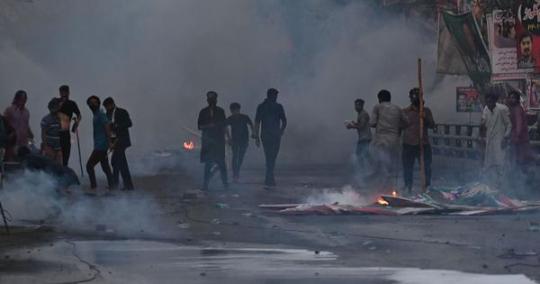
Former Pakistan Prime Minister and chief of Pakistan Tehreek-e-Insaf (PTI) Imran Khan’s arrest from outside the Islamabad High Court (IHC) on Tuesday has triggered a widespread unrest and violent choas across the country. Protesters burnt tree bushes, tyres and threw bricks and blocks on the roads leading to the General Headquarters (GHQ) in Rawalpindi, while others pelted stones and bricks at the main gate of the GHQ. Islamabad, Lahore, Karachi, Peshawar and other major cities across the country saw PTI supporters block main highways to voice their anger.
While the arrest of Imran Khan by the National Accountability Bureau (NAB) and Pakistan Rangers officials could prompt an anti-government uproar; the anger of PTI supporters was reportedly more targeted towards the military establishment and their offices, homes and installations.
“Imran Khan is our redline. He is the only hope for us and our country’s future. They’ve arrested him to silence him. But we will not let that happen”, said a female protester present at the one of the protests with her seven-year-old daughter.
Soon after Khan's arrest, protesters raised slogans primarily targeted at the military establishment and not at the current ruling coalition government.
“The uniform is behind the abduction. The uniform is behind this terrorism," shouted PTI supporters.
As the protests erupted, the angry PTI supporters started marching towards the GHQ in Rawalpindi, military controlled areas, Corps Commander’s residence in Lahore and other military managed areas.
Their anger was aimed at the military establishment, whose officials have plotted against Khan to ousting and conspiring against him by supporting the ruling PDM (Pakistan Democratic Movement) government.
The protests turned more violent as police vehicles were vandalized and residence of corps commander attacked in Lahore. Many vehicles were damaged with steel roads, bricks, stones, blocks and batons.
On the other hand, Islamabad High Court (IHC) took notice of the arrest of Imran Khan and called NAB officials questioning Khan's arrest.
PTI supporters, who hoped that IHC would order immediate release of their chief, were disappointed when the court termed the arrest as "legal".
Political experts say that this is a fight between Imran Khan and the military establishment. “The arrest of Imran Khan was mode over Al-Qadir Trust case. However, PTI protesters opted to slam and target the military establishment, accusing them of being behind his arrest. It seems that the military establishment has had enough of Imran Khan’s ongoing accusations. It’s been long since Khan has been warning, threatening and accusing the intelligence agencies, army officials and others with grave and serious charges, including that of assassination attempts," said senior political analyst Rizwan Razi.
PTI has decided to challenge Imran Khan’s arrest by NAB in the Supreme Court of Pakistan (SCP) and continue to protest against it until their leader is released.
1 note
·
View note
Text
Nana,
Asalam u aleikum. I hope you're okay. I slept around 10 in the morning and woke up around 5 30. I got to know that they arrested Imran Khan. He was at High Court Islamabad for his hearing, and the rangers arrested him from there. They arrested him very badly, and it's quite evident that the army was behind it all. Everyone's scared they'll kill him or something. The people have burnt governor houses, the house of corps commander in lahore and peshawar. The whole Pakistan is shut down right now. Even the exams have been cancelled for today, and they'll update as per the situation. People won't sit at home until they get their leader back, and I hope he comes back safely in sha Allah and that these cowards get a reality check by God. Sigh. I prayed asr and the qaza namaz for zuhr around 5 45. Then I had something to eat and prayed maghrib. I kept laying down till 8 30 because I felt so lazy. I started studying after that and did so till 12. I did take small breaks, but that was it. I prayed isha and tahajjud around 2 45 and studied again. Then I prayed fajr and took a break. I started studying again around 5 30 and just got done. I'm not done yet, though I took a break and will revise another chapter before sleeping. I'm really stressed about my exams, nana jee. Please pray for me. I really need your prayers. I miss you so much. I love you the most. I can't wait for exams to be over so I can finally do whatever I want to instead of studying all day long. Sigh. It gets really exhausting. I hope everything goes well in sha Allah. I miss you so much, nana jee. I love you so much. Please be okay and visit me in my dream soon. I'll wait for you like I always do. Please wait for me too. I love you, and I miss you.
0 notes
Text
'Why did he open doors for terrorists': Maryam Nawaz blames ex-ISI chief for Peshawar blast
PTI chairman Imran Khan’s facilitator – Gen Faiz Hamid – who was posted in Peshawar (as Corps commander) was responsible for the Peshawar attack, Nawaz Sharif’s daughter Maryam Nawaz said. Lahore,UPDATED: Feb 2, 2023 03:00 IST Pakistan’s deposed prime minister Nawaz Sharif’s daughter Maryam Nawaz (Photo: Reuters) By Press Trust of India: Pakistan’s deposed prime minister Nawaz Sharif’s…
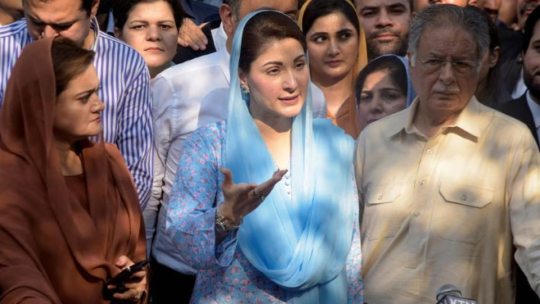
View On WordPress
0 notes
Text
Imprudent comments by politicians about Peshawar Corps Commander Lt Gen Faiz Hameed very inappropriate: ISPR
Imprudent comments by politicians about Peshawar Corps Commander Lt Gen Faiz Hameed very inappropriate: ISPR
Lieutenant General Nauman Mahmood handing over the command of Peshawar Corps to Lieutenant General Faiz Hameed. — ISPR ISPR says such statements “undermine honour and morale of institution and its leadership”. Says Peshawar Corps is an “illustrious formation” that has been “spearheading national war against terrorism for over two decades”. Says one of most competent, professional officers is…
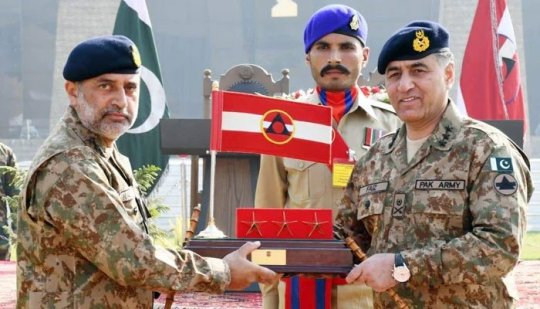
View On WordPress
0 notes
Photo
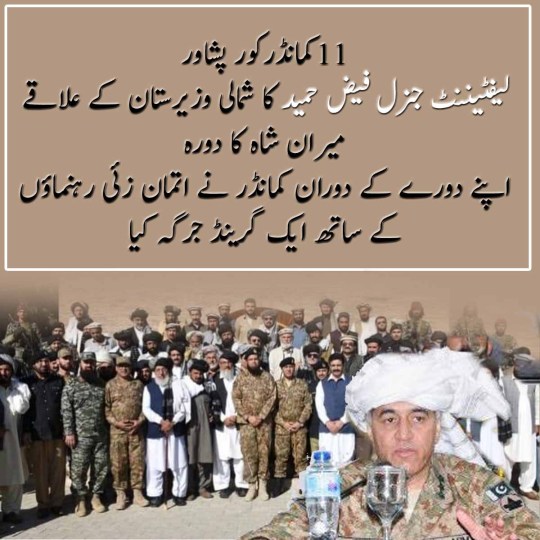
Commander 11 Corps Peshawar, Lieutenant General Faiz Hameed visits Miranshah, North Waziristan
During his visit the Commander held a grand jirga with Atmanzai leaders
1 note
·
View note
Text
DG ISI Faiz Hameed pays farewell call on PM

Director General ISI Lieutenant General Faiz Hameed paid a farewell call on Prime Minister (PM) Imran Khan in Islamabad today.
During the meeting, the prime minster appreciated Faiz Hameed’s services as DG ISI and extended best wishes over his new appointment as Peshawar Corps Commander. Earlier, Lieutenant General Nadeem Ahmed Anjum was appointed as DG ISI.
According to Inter-Services Public Relations (ISPR), Lieutenant General Faiz Hameed was appointed as Corps Commander Peshawar.
https://ift.tt/3coFwg1
0 notes
Text
Former ISI chief Faiz Hameed can become Pak Army head with Imran Khan's support
Former ISI chief Faiz Hameed can become Pak Army head with Imran Khan’s support
Image Source : ANI Former ISI chief Faiz Hameed can become Pak Army head with Imran Khan’s support Faiz Hameed, who was removed as the Director-General of the Inter-Services Intelligence and appointed as the Peshawar Corps Commander, can become the Pakistan Army head with the support of Prime Minister Imran Khan. Hameed is said to have been handling military and diplomatic roles and also…

View On WordPress
#Faiz Hameed#Faiz Hameed Pak Army chief#Former ISI chief Faiz Hameed#Hamid Gul#Haqqani Network#Imran Khan#ISI#Qamar Javed Bajwa#Taliban
0 notes
Text
General Nadeem Ahmed Appointed As The Head Of ISI
General Nadeem Ahmed Appointed As The Head Of ISI
Gen. Nadeem replaces Lt. Gen. Faiz Hameed as the head of the country’s premier intelligence agency. Including new appointments to the Karachi, Peshawar, and Gujranwala corps commanders.But the most important appointment was the change of command at ISI headquarters, often called Abpara. Prime Minister Imran Khan and the media wing of the army approved the appointment of DG confirmed the move in…

View On WordPress
0 notes
Text
Faiz Hameed: Pakistan army transfers ISI chief in surprise reshuffle | World News
Faiz Hameed: Pakistan army transfers ISI chief in surprise reshuffle | World News
NEW DELHI: Lieutenant General Nadeem Ahmed Anjum has been appointed as the new chief of Pakistan’s powerful spy agency ISI in an unexpected reshuffle. Lt Gen Anjum will replace Lt Gen Faiz Hameed, who has been appointed as the Peshawar Corps Commander. According to Dawn, Lt Gen Anjum was previously the commander of Karachi Corps. He was promoted to the rank of lieutenant general in September…
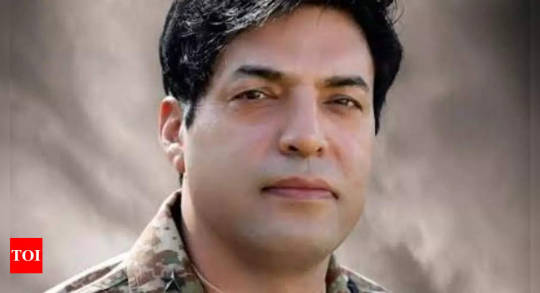
View On WordPress
0 notes